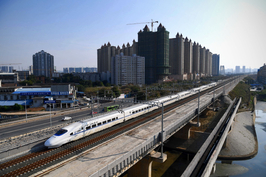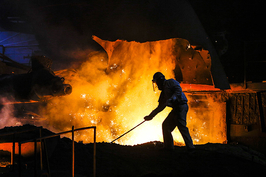CRRC to Produce 160,000 Cargo Trains for Rail Operator

(Beijing) — China’s top train manufacturer, CRRC Corp. Ltd., has secured its largest deal in three years to supply trains to the country’s rail operator, although the contribution to profit growth is likely to be limited amid surging steel prices.
CRRC, together with its 10 subsidiaries, will produce nearly 160,000 cargo trains, involving total revenue of about 6.4 billion yuan ($930 million), for China Railway Corp., sources told Caixin. Another 40,000 units will be provided by four minor train makers.
The price per unit will be the same as last year, but costs could be at least 10% more due to increasing steel prices, a source at CRRC told Caixin.
Since China started to cut excess capacity last year — especially in the coal and steel sectors — steel prices have continued to rise. The price of hot-rolled coils, a type of steel widely used in trains, bridges and ships, jumped 84% last year in Shanghai, and has grown by 6% since the start of 2017, said Miao Peng, a steel analyst with commodity information provider Sci99.com.
“CRRC might have a larger output this year without seeing profit growth. It may even see greater losses the more trains it produces,” the CRRC source said.
The company needs the deal to restart production lines that were closed due to a lack of orders as freight traffic has decreased, an employee of CRRC’s subsidiary in Qiqihar in the northeast province of Heilongjiang told Caixin.
Decreasing coal output amid energy consumption reform has resulted in declining rail freight, which fell by 16% from 2013 to 2016, according to the National Bureau of Statistics.
Although CRRC still maintains its dominance in train manufacturing, some minor rivals have emerged, which account for 20% of the market share combined.
“The minor ones, especially some privately owned train makers, are very flexible. In order to save on wages, they hire workers when there are deals and lay people off when business is sluggish,” a rail transit professional told Caixin.
But the state-owned CRRC is not able to treat its employees that way, the person said.
Contact reporter Coco Feng (renkefeng@caixin.com)

- 1Cover Story: China Carves Out a Narrow Path for Offshore Asset Tokenization
- 2Drownings Shake Chinese Enthusiasm for Travel to Russia
- 3China Business Uncovered Podcast: A $15 Billion Bitcoin Seizure and the Fall of a Cybercrime Kingpin
- 4Over Half of China’s Provinces Cut Revenue Targets
- 5Li Ka-Shing’s Port Empire Hit by Forced Takeover Amid Panama Legal Dispute
- 1Power To The People: Pintec Serves A Booming Consumer Class
- 2Largest hotel group in Europe accepts UnionPay
- 3UnionPay mobile QuickPass debuts in Hong Kong
- 4UnionPay International launches premium catering privilege U Dining Collection
- 5UnionPay International’s U Plan has covered over 1600 stores overseas





